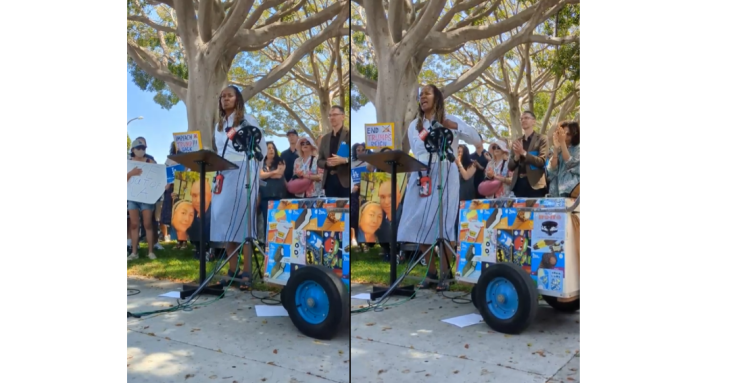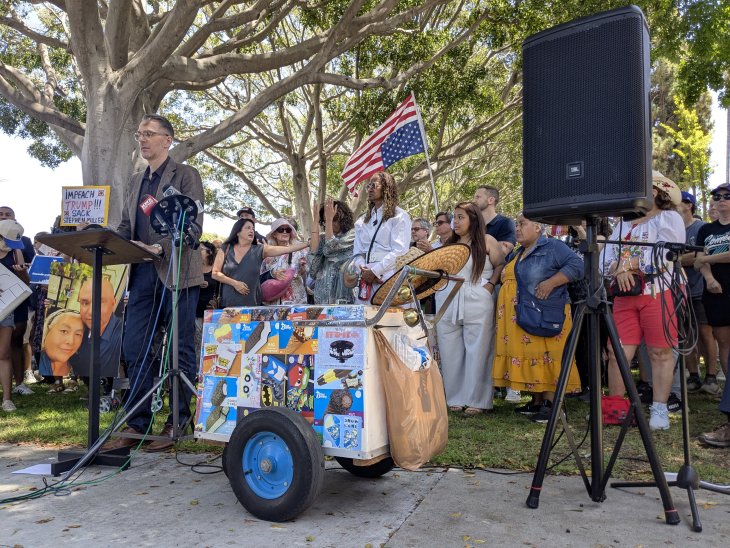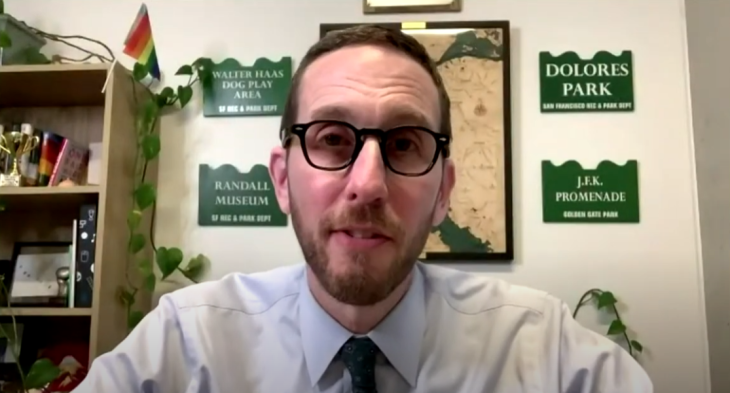
BY MATTHEW BAJKO (with additional reporting by TROY MASTERS) | Many times a day on Blackburn Avenue, Stuart Isen, a 72 year old refugee of Nazi Germany who is also HIV+, walks his dog Sara, a 14 year old Miniature Schnauzer, back and forth from Sweetzer to Fairfax and back. The whole neighborhood knows them.
Isen adopted Sara at birth and is concerned the she may ‘kick the can,’ so, with the assistance of a neighbor, he has turned to a City of Los Angeles program that connects Seniors with older dogs in need of adoption.
“I’ll kick the can soon so I don’t want a puppy…so much energy! Sara is a good girl, docile, sweet and unusually quiet,”said Isen. “I’m an old queen and we walk and talk all day. We meet new people every day.”
“I can’t imagine him without Sara,” says Roni Miller, the neighbor who is helping Isen with his adoption of a new dog. “If it doesn’t work out and Sara hates the new dog I will keep it until she passes. But everyone thinks this is a good idea for Stu.”
Isen has had three previous dogs: “Molly was my first husbands dog and she died soon after he passed. He had AIDS when it was a death sentence and Molly never left his side when he was sick. She grieved as much as I did and then she just collapsed one day. I had to have another being with me…I would have just died. I found Zebra online and she lived to be 14 years old. I got Sara just before Zebra passed.”
The exercise he gains from walking Sara also benefits Isen, who recently had a mild heart attack and valve repair.
“The first thing I asked the doctor after my surgery was ‘where is Sara?’ says Isen. “She’s all I have; no kids, not much family left.”
Talk to any pet owner and they will tell you about the joy they derive from their animals, whether dogs, cats, birds or any other creature in their care. Seniors, in particular, say their pets boost their mental and physical health.
Yet aging researchers are just beginning to take notice of how pet ownership can be a boon for older adults, especially LGBT seniors who are more likely to live alone and lack family connections. Their findings are bolstering calls by senior advocates for policies that foster pet ownership among older adults, particularly those who live in assisted living facilities, retirement homes, or rental apartments that ban pets.
“The love and affection pets bring to people are very important,” said Anna Muraco, Ph.D., an associate professor in the Department of Sociology at Loyola Marymount University in Los Angeles.
“I’m an old queen and we walk and talk all day. We meet new people every day.”
In November, at the 68th annual conference held by the Gerontological Society of America, Muraco presented a study titled “Life Saving in Every Way: The Role of Pets in the Lives of Older Lesbian, Gay, Bisexual and Transgender Adults Ages 50 and Over” that she co-authored with Jennifer Putney, Ph.D., an assistant professor at Simmons College in Boston.
They culled through the findings of the National Health, Aging and Sexuality Study: Caring and Aging with Pride over Time, the first national LGBT senior study that the National Institutes of Health first funded in 2009, to create their sample of LGBT seniors with pets. They also looked at a subsample of 59 respondents from the Los Angeles area that they interviewed.
Of the 1,039 LGBT seniors in the national aging study who owned a pet, 49 percent were female. Forty-four percent had at least one pet, and 49 percent of pet owners had a disability.

“Pets help with mental and physical health, provide connection to other people, and give their owners a reason to get out of bed in the morning,” said Muraco. “Pets help ward off depression, and dogs are a good way for people to get out and exercise.”
The LGBT aging study’s lead researcher, Karen I. Fredriksen-Goldsen, Ph.D., who is also listed as an author of the pet ownership study, noted that one of the LGBT senior community groups that collaborated on the Caring and Aging with Pride study requested that it include a question about pet ownership, which it initially did not.
“They said we go into homes of seniors day after day and pets are sometimes their only social support,” said Fredriksen-Goldsen, a lesbian who is the director of the Hartford Center of Excellence at the School of Social Work at the University of Washington.
Jane A. McElroy, Ph.D., an associate professor at the University of Missouri Family and Community Medicine Department, was also asked to add a question about pet ownership in a study she is overseeing focused on the physical fitness of lesbians and bisexual women.
Of the 105 participants in the study, 33 percent answered yes when asked “Do you have a dog in the household that is regularly walked?”
“Not only does having pets provide comfort to older lesbian and bisexual women, but they also support their owner’s health,” McElroy told the The Pride LA. “Walking their dogs naturally supports physical activity, and everyone knows getting off the couch and moving is important for staying healthy.”
During their presentation at the November symposium Fredriksen-Goldsen led that looked specifically at LGBT aging research, Muraco and Putney noted that there is a lack of long-term studies looking at how pets contribute to their owner’s mental and physical health over time. The women are looking to do their own longitudinal study on the benefits of pet ownership for LGBT seniors.
One concern of the LGBT seniors they spoke with was the financial consequences of owning a pet, as many live on limited incomes. Even the seniors in their study who lived in West Hollywood, which has a city policy that allows residents age 62 and older to have two pets, even if they live in an apartment that bans them, worried their landlord would raise their rents if they adopted an animal.
“Housing is a very important issue for seniors,” said Putney.
Obvious benefits
Not all senior housing facilities are accessible to pets, they noted, which can be a challenge when older adults can no longer live on their own but refuse to move without their pets.
They suggested that local agencies promote various services to assist seniors who want to have pets, such as providing low cost pet food and veterinary care to dog walkers or people who will clean up after a cat.
Asked by the The Pride LA if their recommendation to seniors is to get a pet, Muraco and Putney both said if they can care for the animal then they should.
“It seems to be yes, if they can do it then get a pet,” said Putney, adding that, “We do have to think about the animal’s well-being. As long as we are paying attention to the well-being of the animals, then I think it is a good idea.”
Muraco cautioned that, “Pets do die. So if the person is already faced with a lot of bereavement, they may not want one.”
Bill Ambrunn, 52, a gay attorney who chaired San Francisco’s LGBT Aging Policy Task Force, told the The Pride LA that the benefits of pet ownership should be obvious to policymakers and those who care for the elderly, in particular LGBT seniors who consider their pets to be their children or part of their families of choice.
“I know so many older people in the LGBT community who you wonder how they would function without their pets,” said Ambrunn. “My last dog, she went everywhere I went.”
Following the death of Fannie, whom he had for 14 years, Ambrunn in October 2014 adopted Hudson, a now 2-year-old German shepherd mix.
“The same day Fannie died I adopted Hudson. I didn’t want to come home to an empty apartment,” he said. “The thought was too depressing to me.”
Although the city task force did not make any specific recommendations regarding seniors and pets, Ambrunn said it would make sense to provide seniors help to care for their pets. He pointed to the San Francisco agency Pets Are Wonderful Support, which recently merged with the Shanti Project and cares for the pets of people facing life-threatening illnesses, as one example.
“PAWS does a great job, but I am concerned as the so-called silver tsunami breaks if there is going to be enough resources for seniors to care for their pets when they need help,” said Ambrunn, referring to the country’s rapidly growing senior population. “I have a 90-pound dog and a lot of my friends couldn’t walk him. Just because you have friends who care for you, they might not be able to care for your pet.”
More research into the benefits of pet ownership could bolster calls for senior living facilities to adopt pet-friendly rules, noted Ambrunn.
“The issue that keeps coming to my mind is housing. I can understand there would be some issues around dogs, but if you can’t even have cats,” he said, then having the research to back up claims that pets are beneficial “could get facilities to allow pets.”
In Los Angeles pets are allowed at the 75-unit low-income senior housing Triangle Square Apartments. Located at 1602 N. Ivar Street, on-site services are provided by the Los Angeles LGBT Center in an effort to address the health, social and recreational needs of LGBT seniors.
Pets, including dogs, are allowed although a deposit of $300 is required if it’s not a service animal needed for a resident’s health, according to the Triangle Square’s website.
“We completely get that our residents benefit by having pets,” said a spokesperson for McCormack Baron Management, the property management firm for the property. “Pets, particularly dogs, create a great sense of community and vitality. They increase involvement and activity levels and that is vital on every health front for our residents.”
Gay seniors are four times less likely than their straight counterparts to have children or grandchildren to support them and twice as likely to live alone, according to a study by the National Gay and Lesbian Task Force Policy Institute.
Nationwide, an estimated 2 million people age 50 and older identify as LGBT, and that number is expected to double by 2030, according to the Institute for Multigenerational Health at the University of Washington. An estimated 65,000 LGBT people age 65 and older live in Los Angeles, according to the L.A. Gay & Lesbian Center.
“Loneliness can become an issue as we get older, and often it leads to depression and physical problems,” said Tanya Witt of the Los Angeles LGBT Center’s Senior Services. “The routine of caring for a pet gives structure to a senior’s daily life. Having a furry friend means making a promise to be involved in all aspects of the pet’s life. This commitment encourages seniors to socialize, exercise, and lead their lives with value and purpose.”
Recognizing the benefits pets can bring to seniors, the city of Los Angeles makes it easy and affordable to adopt a pet. LA Animal Services Seniors for Seniors is a program that matches senior companion animals (age 7 +) from Los Angeles Animal Shelters with senior adults (age 62 +). LA Seniors aged (62+) can easily qualify to receive a $10.00 dog license if you show proof of current rabies vaccination and a Spay/Neuter Certificate valued at $70 for use at participating veterinary hospitals. For more information about $10.00 dog licenses for seniors,click here, or call the Department of Animal Services Licensing Division at 213-482-9550.
San Francisco’s Senior LGBT housing program, Openhouse, four years ago began organizing monthly visits for its clients to interact with the dogs rescued by Muttville, an agency that helps facilitate adoption or hospice of older dogs. They offer a services that helps older people find an older dog. At their December meet up four people stopped by for the canine “cuddle club.”
Rebecca Lockhart, 50, who is bisexual and lives in a senior living facility in San Francisco, forgoes having her own dog because of her roommate. Instead, she has been coming to the monthly get-togethers at Muttville for the past 18 months.
“It’s just a real loving environment. I really like the dogs and I like the contact,” said Lockhart, whose husband, who resides in their apartment, is considering adopting kittens.
The couple’s dog, Charlie Parker, died in 2014 at the age of 18. Because they both have disabilities, it was impractical for them to adopt another dog, explained Lockhart. She now helps care for the pets of the other residents where she lives.
“I was a registered nurse for 25 years, so it is an easy fit for me,” she said. “I help out as much as I can.”
William Langley, 72, a gay man who lives in San Francisco, had cats and dogs for 40 some years but now prefers not to own a pet. Instead, for roughly two years, he has been participating in the Openhouse outings to Muttville.
“I can still get my dog noogies in,” said Langley, noting that the rescued dogs “need the attention.”
He doesn’t doubt that pets can improve the lives of seniors.
“I have seen a lot of older gentlemen recently retired walking their dogs they finally got after their long careers. It is fun to watch because the dogs are often walking them,” he said.
Gay San Francisco resident Frank Brooks, 70, started going to the Muttville meet-ups three months ago. He thought about adopting his own dog after he retired in 2013 but his building doesn’t allow pets and he doesn’t want to risk losing his lease even if he received a doctor’s note to have a service animal.
“Dogs are the best embodiment of people without the crap,” said Brooks as a canine companion, Oliver, snuggled in his lap. “I get a lot out of this. This takes care of my canine craving.”
Since 2007 Muttville has offered a special seniors adoption program where it waves its fees for older adults. It has since placed more than 1,000 senior canines with seniors aged 62 and older.
“There are not a lot of statistics but we all know it,” said Muttville Executive Director Sherri Franklin, in regards to the health benefits seniors can derive from their pets.
Isen, the Los Angeles man who walks his dog on Blackburn Avenue, when told of Muttville’s program said, “I’m calling them. Can you give me the number?”
To learn more about Muttville’s program for seniors, visit http://www.muttville.org.
This article was written with support from the Journalists in Aging Fellowships, a program of New America Media and the Gerontological Society of America, sponsored by The Scan Foundation. A version was also published in the Bay Area Reporter.























